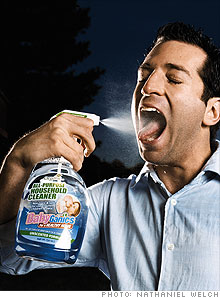Pitching Mother Nature
These makers of eco-friendly products know how to stand out in a market rife with green hype.
 |
| Kevin Schwartz, CEO of BabyGanics, is willing to drink his cleaning fluid to prove that his product is green. |
(Fortune Small Business) -- Let it never be said that Kevin Schwartz's marketing isn't tasteful. Schwartz is founder of BabyGanics, an 11-employee outfit in Oceanside, N.Y., that makes green cleaning supplies. Whenever Schwartz demonstrates his product's eco-friendly attributes, he fills a shot glass with a BabyGanics product and drinks it.
Schwartz, 32, has tossed back his formula (ingredients include palm kernel oil and organic salt) at trade shows and in-store promotions and during live television interviews. Sometimes he invites onlookers to join him, offering shots of a nonorganic rival brand such as Fantastik.
"It definitely makes the point," says Schwartz. "My cleaners taste bad, like soap really. But they're safe to drink."
Gimmicky? Absolutely. But BabyGanics, which topped $1 million in revenues in 2007, has managed triple-digit profit growth over the past four quarters. Its household cleaners are sold at chains such as Babies "R" Us, Bed Bath & Beyond (BBBY, Fortune 500), and Giant Food and will be available in 2,000 stores nationwide by year-end.
Today's green-minded consumers present a tremendous opportunity for any company that has an environmentally friendly product or service. Get your product and message right, as did BabyGanics, and you can find gold in green. Experts say that the market - for everything from organic toothpaste to hybrid cars to eco-tourism - hit an estimated $250 billion in 2007 and has been growing at roughly 10% annually. Some consumers will pay a premium of as much as 15% for green products.
But there's a catch. "The green market is a different game with a whole new set of guidelines," says Gwynne Rogers, an analyst with Natural Marketing Institute, a consulting firm based in Harleysville, Pa.
Rogers argues that if your environmental claims aren't accurate or clear, they could end up hurting your company. The hype has already gotten so out of hand - "We're all natural," "We're planet friendly," "We're 100% organic" - that many businesses are now being accused by consumers, bloggers, and journalists of engaging in green-washing. TerraChoice Environmental Marketing, a Philadelphia consulting firm, recently conducted a study that identified more than 1,000 products on U.S. store shelves making distorted or unsubstantiated claims. Among the culprits: wax paper boasting "recycled content" without identifying the amount, and a shaving gel touting itself as "CFC-free," even though that ozone-depleting compound has been banned in America for years.
Because the market for green products and services is relatively new, buyers are justifiably confused by claims such as "recyclable," "low-energy," and "environmentally friendly." So they seek guidance from impartial parties that can verify them. Endorsements that are influential with consumers include "USDA certified organic" for foods and Energy Star for appliances. Undergoing the often rigorous certification process required by these organizations is well worth it, say green-marketing experts, who advise business owners to place any seals earned on every piece of marketing material.
"It's shorthand," says Lance Funston, president of Green Road Marketing, a Portland, Ore., consulting firm. "There's so much 'We're green' out there. A seal offers instant credibility."
Centria, a century-old manufacturer of steel building parts, recently earned a cradle-to-cradle certification from McDonough Braungart Design Chemistry. Based in Charlottesville, Va., MBDC was co-founded by William McDonough, a pioneering architect who built the first green U.S. office building in 1985, and by Michael Braungart, a founding member of Germany's Green Party. MBDC's certification is awarded to products that are created using eco-friendly processes and can ultimately be recycled - hence cradle-to-cradle.
MBDC inspectors visited Centria's headquarters in Moon Township, Pa., studied its factories, interviewed suppliers, and worked through a 100-item checklist that covered issues such as biodegradability, toxicity, and ozone-layer depletion. Centria had to make several changes to gain certification. For example, it had to render recyclable a clear plastic film that covered the metal walls its sells for protection during shipping. After a year, MBDC granted certification. Centria uses the seal in all its packaging and promotional materials, and on the company website. It has given sales an incredible boost, says Centria CEO Mark Sherwin, 52. Since 2006, when the seal was awarded, the products have registered revenue gains of around 15% a year compared with 4% before certification.
"We are able to show that we have a true green product," says Sherwin. "That's meaningful to architects and builders and distinguishes us from the pack."
Establishing green credentials is one thing, but business owners also must consider the tone of their messages. Though the fate of the earth is a weighty subject, successful companies often employ a gentle green touch, relying on humor or even a note of self-deprecation.
"Make people feel overwhelmed by how bad things are, and you'll never sell," says Andrew Shapiro, CEO of GreenOrder, a New York City business-strategy consulting firm. "They'll be paralyzed by fear. The key is to be positive and keep it light."
Amid all the greenwash, consumers have grown wary of companies that sell earth-friendly items while wasting resources. Here's a common scenario: A company sells an eco-friendly product that makes a difference, but its employees photocopy using nonrecyclable paper, and leave the lights on when they head home at night.
"I see a big change," says Kristina Skierka of Bite Communications, a public relations firm in San Francisco. "The press is starting to dig around and ask, 'How green is this company really?' "
Salesforce.com (CRM), a San Francisco-based maker of customer management software, recently announced that it was becoming carbon neutral by purchasing offsets. But a blogger reported that the firm mailed a press kit that included a mug, chocolate, and a folder with an image of a polar bear - all surrounded by Styrofoam peanuts, which take years to decompose. A company spokesperson declined to comment.
So if you make environmental claims about your product, think green beyond your marketing. It will keep the bloggers at bay. It will help the planet. And it's good business. ![]()
Selling green
Eco-friendly office supplies
Investing in a green work environment
-
The Cheesecake Factory created smaller portions to survive the downturn. Play
-
A breeder of award-winning marijuana seeds is following the money and heading to the U.S. More
-
Most small businesses die within five years, but Amish businesses have a survival rate north of 90%. More
-
The 10 most popular franchise brands over the past decade -- and their failure rates. More
-
These firms are the last left in America making iconic products now in their twilight. More













